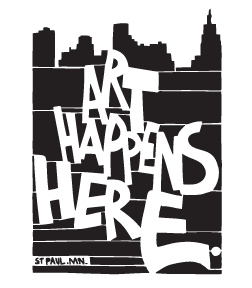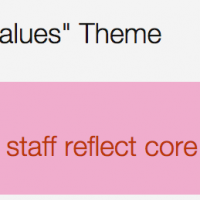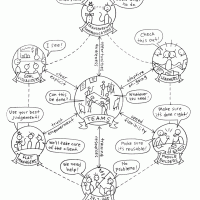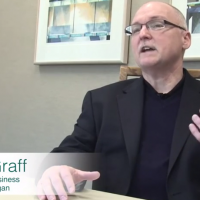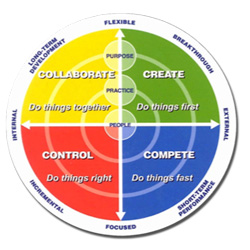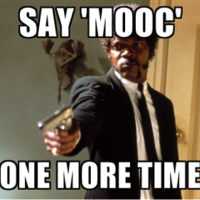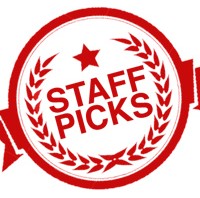One of the reasons Springboard for the Arts is able to take on and implement large scale projects with their small team is through leveraging their staff. The staff lives and breathes seven principles: We view artists as vital contributors to their communities. Our programs are delivered by artists to artists. Our capacity to build relationships is the basis of our effectiveness. We emphasize building systems of investment and support. We develop cross-sector collaborations. We operate with a sense of transformational … [Read more...]
Core Values & Cupcakes
An Ideation Summit is a process that transforms stakeholders with divergent interests into collaborators. It provides a roadmap for identifying, clarifying and activating solutions. NAS has built an event that does just this, The Summit at Sundance. We’ve designed a process that empowers a group of colleagues to harness their collective brainpower and wisdom and tackle tough challenges facing their work. Our first Ideation Summit brought CEOs together to collectively work on real-world solutions to four key problems facing the field. The … [Read more...]
Marginal Thinking & Our Personal Boundaries
Clayton Christensen eloquently takes the conventional business idea of marginal thinking and applies it to personal decision-making, in this Harvard Business School piece. We may think that making a decision to cross our personal boundaries “just this once” might have a low/marginal cost, but when we begin to weigh the actual costs, we could end up bankrupt or down the rabbit hole of lies and deception. Christensen asks us to question our personal values and morals. That's what the devil and angel on our shoulders are for, right? How do you … [Read more...]
Values: A Part of the Everyday
Our personal values relate to decisions we make every day. Even the most mundane according to, Joel Urbany, author of How to Make Values Count in Everyday Decisions. We know, this got us all thinking about what it says about you when you leave your desk for that third cup of coffee or that you always eat out for lunch. Urbany dives into the term values-based decision making and draws a direct line between organizational values and those of individual employees, noting that this directly effects the overall decision making ability of an … [Read more...]
Get to Know Your Team
“There is a real reason for getting to know the people you’re working with.” Surry Scheerer, executive coach and lecturer at the University of Michigan Ross School of Business and Ford School of Public Policy, suggests that leaders and their organizations take a more mindful approach to building and supporting teams. Sheerer emphasizes the importance of team building whether your team exists in a conference room or through virtual means. How do personal values influence teamwork? Do you know what your colleagues value most? Tell us in … [Read more...]
Constructive Conflict
Jeff DeGraff, a professor at the University of Michigan’s Ross School of Business, expands on the Competing Values Framework, sharing how the creation of constructive conflict allows for internal innovation. How do you see constructive conflict in your own values? Do you see this between your personal values and that of your organization? Tell us in the comments section or at #ValuesNAS. … [Read more...]
A Return to The Competing Values Framework
The Competing Values Framework is one of the best tools that allows organizations to assess their internal culture. You can have each staff or team member share the current and preferred values of the organization, analyzing where “competing values” fall. This exercise gives employees buy-in and provides space for the sharing of organizational and personal core values. Check out our original post on the Competing Values Framework that appeared on Field Notes in December 2012. You can see what we learned by completing the exercise internally … [Read more...]
Do Your Values Actually Mean Something?
In this Harvard Business Review article, Patrick M. Lencioni discusses how constructing organizational core values is not a simple or meaningless task. We cannot and should not establish values because “we think we should” or “it’s the right thing to do.” They must be based on true meaning and upheld to the highest standard. Ensuring the core values of an organization resonate positively with employees is essential. Lencioni states that core values should be integrated with every employee-related process in the organization and that … [Read more...]
Values and What We Do
It’s pretty easy to identify the values of a cultural organization or initiative. Most mention them somewhere on their website, if not have an entire web section dedicated to this. We talk about values often, too. Inclusivity, equity, excellence are all frequently discussed at our conferences. Values are important to identify and certainly important to name, discuss and debate. It’s helpful for potential stakeholders to know what you stand for and for the world to know what we stand for, as a field. But I’m less interested in talking … [Read more...]
An Experiment
Field Notes is our space to reflect on conversations with leaders in the field and issues we find most relevant or personal to our work environments. It is a place for us to share the ideas of the leaders we have the pleasure of working with and to start conversation on what matters most. These ideas are meant to provide opportunities for others in the field to reflect, share, learn and discuss. Above all else, we want everything we write to be useful. We thrive on leaders coming together to find solutions to their challenges. We don’t take … [Read more...]
Cooking, peaches and tasting the arts
My mother hates fruit. She also hates vegetables. That is, unless they are covered in bleu cheese and bacon. For these reasons, I grew up in a house where steamed broccoli covered in Velveeta or garlic mashed potatoes were served alongside our steak or ribs. My father would often say that my siblings and I were going to grow up with the worst eating habits. Today, my mother often laughs at this statement when she reflects on the way things turned out. I am a product of the slow food movement. Kind of. Maybe Diane just makes … [Read more...]
What I Talk About When I Talk About Open (Education)
In late April, NAS attended the Open Education Global Conference 2015 in Banff, Canada. We were fully prepared to “wonk” out – and weren’t disappointed. If you’re wondering “what is open education?” – you're not alone! The Open Education Consortium (a conference organizer) offers a definition: Open education encompasses resources, tools and practices that employ a framework of open sharing to improve educational access and effectiveness worldwide. Put another way, open education is the application of open source principles that may be more … [Read more...]
What is the place of cultural institutions within their communities?
NAS produces publications, videos and other management tools to inspire those working in the field to take a fresh look at their work and the challenges they face. Over the last few years we have amassed quite a large catalog of content. We’ve sent NAS staff members into the archives to pick their favorites and share them here. This week NAS' Program Coordinator, Taylor Craig and Josh Miller, Executive Assistant share their reactions to one of their favorite videos. Place Becomes Identity By Taylor Craig Tisa Ho, Executive … [Read more...]
Being the Boss
NAS produces publications, videos and other management tools to inspire those working in the field to take a fresh look at their work and the challenges they face. Over the last few years we have amassed quite a large catalog of content. We’ve sent NAS staff members into the archives to pick their favorites and share them here. This week NAS’ President & CEO, Gail Crider, shares one of her favorite NAS videos. Brian Kennedy, Executive Director of the Toledo Museum of Art speaks about the book Being the Boss: The 3 Imperatives for … [Read more...]
Growing the Pie Together: Fostering Giving Networks in the Arts
Over the past nine months, I’ve witnessed something truly remarkable take shape: a network of committed givers in the arts. Not a network that operates on a tit-for-tat basis, not a group that invests in others with the goal of personal gain in the long run, but individuals who are just as dedicated to advancing each other’s work as they are to advancing their own. This network is the Creative Community Fellows cohort. If you’ve ever been involved in an arts network (or, heck, any job-focused affinity group) you know this is rare. The flow … [Read more...]

